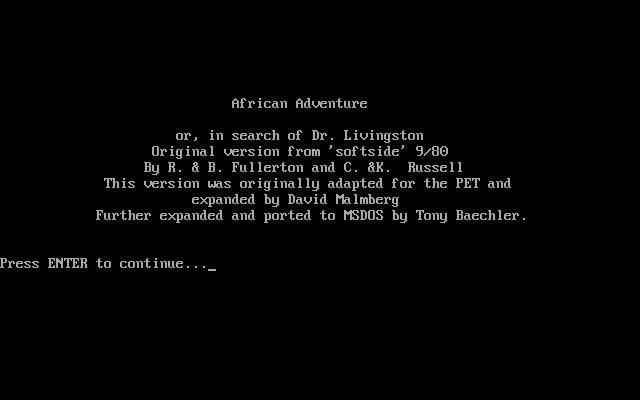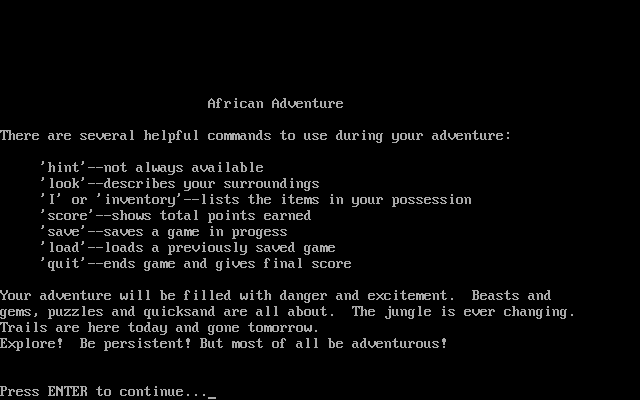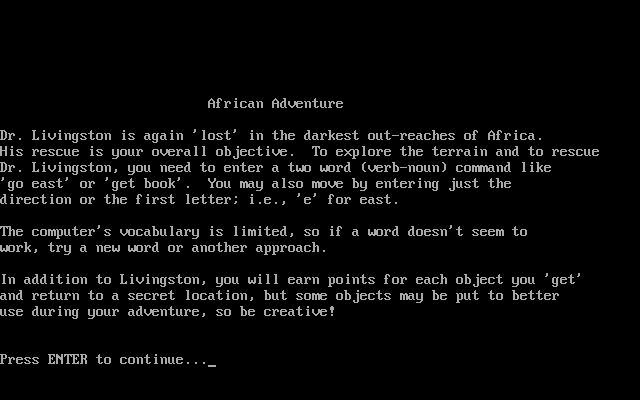Retro Replay Review
Gameplay
African Adventure offers a uniquely stripped-down interface that calls back to the earliest days of computer gaming. All inputs must be in capital letters and consist of a two-word command—typically a verb and a noun, like “GET BOOK” or “GO EAST.” This simplicity forces the player to think carefully about each action, turning every decision into a puzzle. Whether you’re choosing the right direction to navigate the deadly rivers or deciding which item to pick up, the game keeps you engaged in its text-driven world.
(HEY YOU!! We hope you enjoy! We try not to run ads. So basically, this is a very expensive hobby running this site. Please consider joining us for updates, forums, and more. Network w/ us to make some cash or friends while retro gaming, and you can win some free retro games for posting. Okay, carry on 👍)
The inventory system is straightforward yet surprisingly strategic. You earn points by collecting objects scattered throughout the African wilderness, but many of these items serve a dual purpose. For instance, you may need to use a machete to clear vines in one location and then return it as part of a later puzzle. Managing your limited inventory space and remembering where you left certain items become central challenges that reward careful exploration and note-taking.
Several built-in commands provide support when you hit a dead end. Typing “HINT” offers cryptic guidance, while “LOOK” reminds you of your current surroundings. The “I” command lists your inventory, “SCORE” tracks your points, and “SAVE” or “LOAD” let you manage your progress. These features create a safety net for newcomers to text adventures, making the game accessible without diluting its sense of discovery.
Graphics
Strictly speaking, African Adventure has no graphics. Instead, it relies entirely on text descriptions to paint vivid mental images of sun-baked savannas, dense jungles, and ancient ruins. While this might seem like a drawback to modern gamers accustomed to high-definition visuals, the game’s well-crafted prose allows you to fill in the blanks with your own imagination.
This text-only approach has its own charm. The lack of visual clutter focuses your attention on the narrative and the puzzles. Each location description is concise yet evocative, allowing you to sense the heat of the African sun or the ominous shadows that may conceal Dr. Livingston. If you’re willing to embrace the medium, the game’s world becomes as detailed and immersive as any graphical adventure.
Modern gamers may find the absence of graphics jarring at first, but it’s also an opportunity to experience a piece of gaming history firsthand. The stripped-back presentation places you in the driver’s seat, transforming every line of text into an active component of exploration rather than a passive backdrop.
Story
The narrative premise of African Adventure is timeless: you play a determined explorer on a quest to find the missing Dr. Livingston in the heart of Africa. The story unfolds purely through environmental descriptions and occasional NPC interactions, relying on your own curiosity to propel you forward. There’s no cutscene or voiceover—every clue you uncover must be interpreted and acted upon.
Despite its minimalism, the storyline manages to convey a sense of wonder and peril. Each location you visit hints at Dr. Livingston’s journey, whether through abandoned campsites, cryptic diary entries, or tribal artifacts. The sparse narrative strokes build a tapestry of mystery that keeps you motivated to press on, even if the harsh landscape threatens to overwhelm you.
The game’s pacing is deliberately methodical, reflecting the challenges of real-world exploration. You won’t sprint across the map in minutes; instead, you’ll plan your route, gather supplies, and retrace your steps when you hit a dead end. This slow-burn storytelling approach fosters a deep connection to your objective, making each small victory—finding a hidden spring or decoding a riddle—feel genuinely rewarding.
Overall Experience
African Adventure is a testament to the enduring appeal of text-based games. Its old-school mechanics may seem foreign to gamers accustomed to flashy graphics and complex UIs, but they also strip the experience down to its narrative and puzzle-solving core. If you appreciate interactive fiction or want to explore the roots of adventure gaming, this remake delivers an authentic taste of 1980s computing.
The game’s challenging puzzles and long-term planning requirements make it a satisfying challenge for veteran adventurers. At the same time, the inclusion of hint and save features ensures that newcomers aren’t left stranded. Whether you’re chasing high scores or simply savoring the journey, African Adventure strikes a fine balance between difficulty and accessibility.
Ultimately, African Adventure is more than a nostalgic novelty—it’s a compelling exploration of language-driven gameplay. By empowering your imagination and rewarding careful thought, it offers an experience that remains surprisingly fresh more than four decades after its original release. For history buffs, puzzle lovers, and fans of interactive storytelling, this text-based trek into the African wild is well worth the expedition.
 Retro Replay Retro Replay gaming reviews, news, emulation, geek stuff and more!
Retro Replay Retro Replay gaming reviews, news, emulation, geek stuff and more!








Reviews
There are no reviews yet.